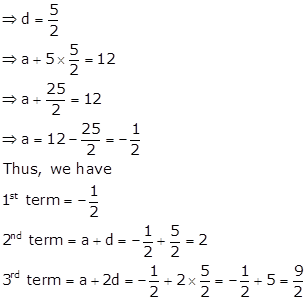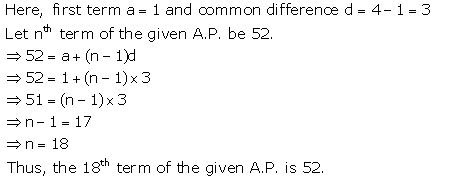Which of the following sequences are in arithmetic progression?
(i) 2, 6, 10, 14,
(ii) 15, 12, 9, 6,
(iii) 5, 9, 12, 18,
(iv)
The nth term of sequence is (2n - 3), find its fifteenth term.
If the pth term of an A.P. is (2p + 3), find the A.P.
Find the 24th term of the sequence:
12, 10, 8, 6,……
Find the 30th term of the sequence:
Is 402 a term of the sequence :
8, 13, 18, 23,………….?
How many terms are there in the series :
(i) 4, 7, 10, 13, …………, 148?
(ii) 0.5, 0.53, 0.56, ……………, 1.1?
Which term of the A.P. 1, 4, 7, 10, ………. is 52?
The given A.P. is 1, 4, 7, 10, ……….
If 5th and 6th terms of an A.P are respectively 6 and 5. Find the 11th term of the A.P
If tn represents nth term of an A.P, t2 + t5 - t3 = 10 and t2 + t9 = 17, find its first term and its common difference.
Find the 10th term from the end of the A.P. 4, 9, 14,…….., 254
Determine the arithmetic progression whose 3rd term is 5 and 7th term is 9.
Find the 31st term of an A.P whose 10th term is 38 and 16th term is 74.

Which term of the series :
21, 18, 15, …………. is - 81?
Can any term of this series be zero? If yes find the number of term.

An A.P. consists of 60 terms, If the first and the last terms be 7 and 125 respectively, find the 31st term.
For a given A.P.,
Number of terms, n = 60
First term, a = 7
Last term, l = 125
⇒ t60 = 125
⇒ a + 59d = 125
⇒ 7 + 59d = 125
⇒ 59d = 118
⇒ d = 2
Hence, t31 = a + 30d = 7 + 30(2) = 7 + 60 = 67
The sum of the 4th and the 8th terms of an A.P. is 24 and the sum of the 6th and the 10th terms of the same A.P. is 34. Find the first three terms of the A.P.
Let 'a' be the first term and 'd' be the common difference of the given A.P.
t4 + t8 = 24 (given)
⇒ (a + 3d) + (a + 7d) = 24
⇒ 2a + 10d = 24
⇒ a + 5d = 12 ….(i)
And,
t6 + t10 = 34 (given)
⇒ (a + 5d) + (a + 9d) = 34
⇒ 2a + 14d = 34
⇒ a + 7d = 17 ….(ii)
Subtracting (i) from (ii), we get
2d = 5

If the third term of an A.P. is 5 and the seventh term is 9, find the 17th term.
Let 'a' be the first term and 'd' be the common difference of the given A.P.
Now, t3 = 5 (given)
⇒ a + 2d = 5 ….(i)
And,
t7 = 9 (given)
⇒ a + 6d = 9 ….(ii)
Subtracting (i) from (ii), we get
4d = 4
⇒ d = 1
⇒ a + 2(1) = 5
⇒ a = 3
Hence, 17th term = t17 = a + 16d = 3 + 16(1) = 19

No comments:
Post a Comment